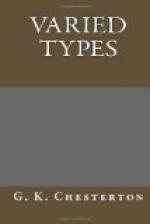Bret Harte had to deal with countries and communities of an almost unexampled laxity, a laxity passing the laxity of savages, the laxity of civilised men grown savage. He dealt with a life which we in a venerable and historic society may find it somewhat difficult to realise. It was the life of an entirely new people, a people who, having no certain past, could have no certain future. The strangest of all the sardonic jests that history has ever played may be found in this fact: that there is a city which is of all cities the most typical of innovation and dissipation, and a certain almost splendid vulgarity, and that this city bears the name in a quaint old European language of the most perfect exponent of the simplicity and holiness of the Christian tradition; the city is called San Francisco. San Francisco, the capital of the Bret Harte country, is a city typifying novelty in a manner in which it is typified by few modern localities. San Francisco has in all probability its cathedrals, but it may well be that its cathedrals are less old and less traditional than many of our hotels. If its inhabitants built a temple to the most primal and forgotten god of whose worship we can find a trace, that temple would still be a modern thing compared with many taverns in Suffolk round which there lingers a faint tradition of Mr. Pickwick. And everything in that new gold country was new, even to the individual inhabitants. Good, bad, and indifferent, heroes and dastards, they were all men from nowhere.
Most of us have come across the practical problem of London landladies, the problem of the doubtful foreign gentleman in a street of respectable English people. Those who have done so can form some idea of what it would be to live in a street full of doubtful foreign gentlemen, in a parish, in a city, in a nation composed entirely of doubtful foreign gentlemen. Old California, at the time of the first rush after




